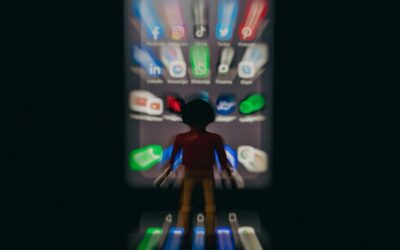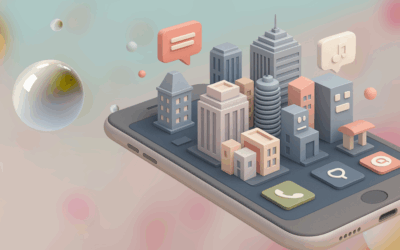After decades of development and exponential growth, it’s safe to say that nowadays digital technology is seen as something mundane. Every company or person that wants to remain relevant has to be part of this digital network we created. There’s no single service that remained untouched by its digital upgrade. We have seen changes in the way we call a taxi, shop, watch television, or pick a restaurant. And the services that haven’t gone digital yet, are long overdue to get on board the digital train. Otherwise, there will be the risk of getting left behind…
Although tremendously important for our society, we can already see the signs that we are already outgrowing the digital era. When there’s a banalisation of technology and less allure and awe for it, it’s easy to assume we have already started moving toward the next big thing. So that being said, I imagine it’s safe to say that we are already living in a post-digital era. Currently, there isn’t that much interest in the technology per se, but the real focus is the trust and experience that’s created from it.
Lessons from history: how people embraced transformation
There are several examples from the past that show this tendency of cyclical eras from their discovery to their decline. A clear example is in the past of a new technology revolution was the rise of electricity. But there is still a long way from the discovery of a new technology until it becomes of global use. It took nearly 100 years from Michael Faraday’s discovery of the electric dynamo and motor until its use had a measurable impact on productivity and became implemented worldwide. Every technology follows a similar path from the moment of its discovery until its breakthrough.
But real transformation requires more than a single technology. First, it must be a part of people’s habits and constantly evolving and expanding through secondary innovations. In this example of the electric revolution, everyone’s mindset had to change. Factories had to completely reimagine themselves to be ready to use this new technology to have a real economic impact. People had to convince themselves of the comfort of electricity and change their habits to adapt to this new lifestyle. In the following decades, everything started gradually having electricity as something common and fundamental, and not as a commodity and luxury. Nowadays, it’s completely unthinkable to not have electricity at home.
So, considering we are living already in a post-digital era, what exactly does that mean? What comes after that? Do we need to start preparing for a new era of innovation with different technologies, like robotics or genomics? Or is the answer already here?
So, after digital, what’s next?
It’s nearly impossible to accurately guess what’s coming next. The speed of how things are developing and growing is honestly scary. Just think that only around 10 years ago Nokia and its reliable mobile phones were the standards of quality, and mobile phones were used merely as something to well… make calls. But then smartphones arrived and became overwhelmingly popular, becoming a major contributor and playing a gigantic part in this digital revolution, by basically connecting everyone, everywhere, all the time.
This digital transformation created a structure that makes it possible to connect everything and use it to improve people’s life. Everything will be more personal, safer and more secure. The services will be tailor-made and the experience of using any type of service will be way more pleasant. There are already some examples and implementations of these types of services. But there’s still a lot of ground to cover until it has is breakthrough.
The resistance to become digital
Once again, people need to adapt their mindset and habits into becoming more receptive to embrace this digital revolution. Currently, there are still some normal “growth pains”, because of all the edges to sharpen. Especially in how we obtain information and in people’s right to privacy. There were always some barriers that prevent a new technology to explode right away. There will always be a level of distrust to something new that changes the way we see the world and how we live in it. It is the way humans are naturally built: to fight instinctively with everything that completely contradicts our predefined ideas and world paradigms.
When we start trusting technology again, we can start enjoying a world where businesses aren’t focused on “becoming digital”. The gto the people and how to deliver a valuable customer or employee experience, in a completely transparent and trustworthy way.
The new guys in digital transformation town
Now thanks to this interconnection of everything, and everyone being “technically proficient”, it is unlikely that the next wave of technology-driven change will be fast enough to penetrate the habits of people like smartphones were.
At least not as sudden and radical as anyone rushing to become “digital”, but rather a slow and steady period of familiarity with these new technologies.
They are already here, building on top of the foundations that are already set for them to proliferate, such as:
- Artificial Intelligence
- Blockchain
- Machine-learning
- Quantum computing
- Virtual Reality
- Augmented Reality
You may have heard of one of these terms as one of the biggest and recent innovations on the market. If not, you can check more technology trends here.
These technologies will help us how to better collect and analyse data and provide more knowledge faster than imagined. At the same time, teaching us how to look at the world in a completely different manner and enhance performance in several jobs and services.
So, answering the question: analogue, digital, what’s next? I would say that after a digital revolution, we’re gradually transitioning from a post-digital world that will not be about the technology, but about the information and what to do with it to help the people.
We are already experiencing some early innovations that allow us to have a glimpse of what the future will be. But we aren’t there yet. Even with some exciting technologies that are already appearing before us, the novelty and excitement factor is not the same.
Unless some major new technology comes with unexpected exponential growth, I think it’s pretty safe to assume that with this new era where information is predominant over technology, we are moving towards is society’s next big thing: an Intelligence Era.
Intelligence Era
You might think that we are already living in the Intelligence Era. Especially with all the amount of Big Data, Internet of Things, and Data Analytics talks. However, even though we have all this data, we are still at the very early stages of this new era. But just having the information is not enough: you need to know what to do with it.
“Information is not knowledge”
Albert Einstein
I believe this exactly describes the exact situation we’re in. We have access to the information but we are still finding the best ways to use it. And no, providing way too specific and somewhat invasive online ads is not one of them.
The business that controls the knowledge, powered by all the information, will control the market in the upcoming years. Right now, we live in a world so focused on trying to get the information, that is even counterproductive and leads to resistance for this era to arrive faster (with GDPR controversy coming to mind).
It’s only after this rush to gold that we will be able to collect the fruits of a society built on top of real Intelligence and proper use of legal information to deliver more suitable conditions to everyone, with a society built like a well-oiled machine, aware of everyone’s real needs in a blink of an eye.
The future of techonologies can be bright…
Businesses can start using intelligence to deliver better customer service and improve their processes in search of talent, business opportunities, and work efficiency. For customers, AI and machine learning will play a big part in anticipating client needs. Chatbots will replace the outdated FAQS and create faster and personalised customer service. The process of repetitive complex processes will be easier for employees with an intelligent work model and use the newly gained time to bring innovation to the company and better apply their competencies in a data-driven model to generate new revenue streams. It’s hard to grasp what will happen once all of this becomes a possibility.
There are absolutely no limits to what we can achieve with the real knowledge of everyone’s needs and preferences. Having a toaster in your house that makes your bread the exact way you like it on Tuesday morning. A fridge that orders the ingredients automatically for you while taking into account your favourite brands and pricing in a proportional ratio doesn’t sound like science fiction anymore. It sounds like a matter of time for this to be available to everyone everywhere, just like… electricity.
…but proceed with caution into the post-digital era
For those who watched Black Mirror, there were some very scary downsides presented of having everything connected and how fast and harmful it can be, having all your information and details easily retrievable online, and the dangers of being heavily exposed in such manners. But it is a fact that our society is evolving in that direction, and we need to be careful with what we share with the world and not trust blindly technology to have our data secured, at least for the time being, while things are still in their early discovery phase.
What do you think? Are you looking forward to this more analytical era? Or you don’t think it’s as exciting as the digital transformation we are still living in? Do you agree with me or do you think the information is a consequence of the digital transformation and there’s a completely new era coming up? Share your thoughts with us!
One thing is for sure: we surely haven’t reached our limits. Whatever is coming next, it will surely be exciting!
Curious about development work in our team? Have a look at a day in the life of an experience developer, and let us know what you think!




